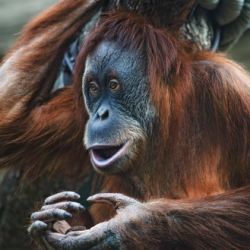Though reality TV would seem to challenge the notion, highly social creatures tend to be more intelligent than non-social creatures. The reason is because it takes brain power to communicate and thrive in a society. A successful wolf, for instance, must be bright enough to pick up on behavioral cues from the alpha male and to understand his place in the social hierarchy.
Cognitive scientists believe that social learning -- i.e., learning behaviors from others -- enhances an animal's ability to learn new things by itself. In other words, social intelligence helps promote individual intelligence. This idea, called the cultural intelligence hypothesis, also has a corollary: Social species should have evolved to be better at problem-solving than related, non-social species.
A team of mostly Swiss researchers put this hunch to the test by studying how two different species of orangutan responded to various intellectual challenges. In total, the authors examined 33 zoo-dwelling orangutans, 19 of which were Sumatran (a more social species) and 14 of which were Bornean (a more solitary species). Their prediction was that the Sumatran orangutans would be more clever.
They were right. In one task, a transparent box with two openings of different sizes contained a piece of fruit. (See image.)

The fruit was placed behind the smaller opening, and it was not possible for an orangutan to extract the fruit through that opening. To grab the snack, an orangutan would have to divert its gluttonous gaze away from the fruit long enough to notice that there was another, larger opening in the box. The Sumatrans were quicker at figuring this out than the Borneans.
Combining the data from all of their cognitive tasks, the authors found that the Sumatran orangutans were six times likelier to solve a challenge than the Bornean orangutans. There was not a single task at which the Borneans were superior.
It would seem, therefore, that sociability has set these two related species down very different evolutionary paths.
Source: Sofia I. F. Forss, Erik Willems, Josep Call & Carel P. van Schaik. "Cognitive differences between orang-utan species: a test of the cultural intelligence hypothesis." Scientific Reports 6, Article number: 30516. Published online: 28-July-2016. doi:10.1038/srep30516
(Image: Orangutan via Shutterstock)

